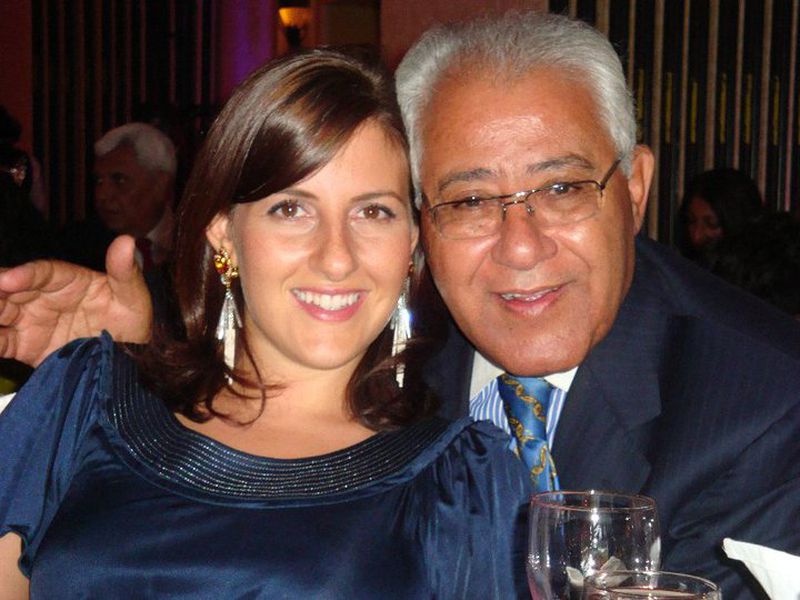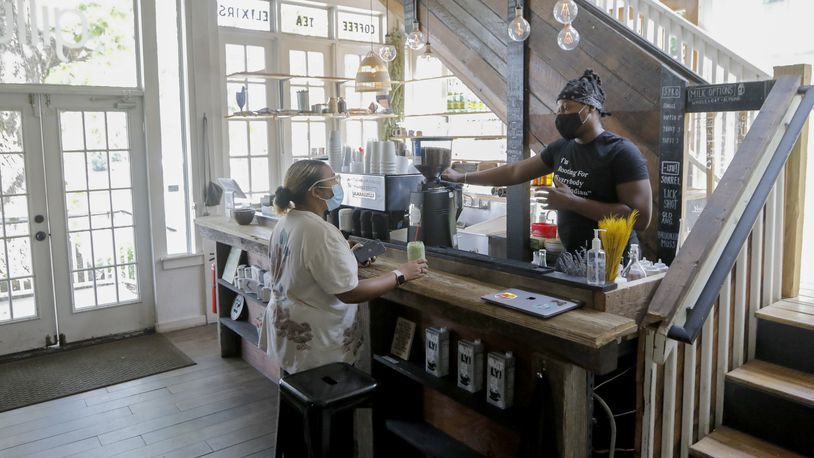Originally posted on The Atlanta Journal Constitution by Paradise Afshar, September 7, 2021.
Stephanie Nadi Olson starts every morning with baba’s voice in her ear.
Their father-daughter chats begin around 5 a.m., and by the time they hang up, Ramadan Nadi has polished off a cup of coffee and Stephanie Nadi Olson is ready to hunker down in her home office.
“I try to keep him posted on what’s happening in my life because I don’t want him to feel disconnected,” she said.
Nadi Olson credits her father with shaping her worldview through long talks centered around his life in Palestine, and lessons he’s learned as a refugee. Those anecdotes have resulted in the Atlanta native developing a sense of community, and a strong desire to give back.
And she’s not alone.
Children of immigrants are often influenced by their parents’ past to contribute to their communities, according to Nicole Guidotti, an English and Latinx studies professor at Emory University.
She said it’s typical for people who’ve lived in places with economic, gender, racial and religious disparities to rely on strong communal ties for survival — and those bonds and those traditions “don’t stop when somebody leaves their home country.”
“I think it’s twofold. One, it’s the dose of privilege like, I have benefited from my parents or my parents’ immigration and therefore I am not just giving back but I am giving back to my parents in a way that honors their legacy,” Guidotti said. “And I also think when we’re talking about Asian and Latinx second generation immigrants, who are the majority, we’re talking about communities that have a strong sense of benevolence and sharing.”
Second generation refers to people with at least one foreign-born parent, according to the U.S. Census Bureau, while first generation refers to people who are foreign-born.
Some children of immigrants will reflect on their childhoods at some point and recognize the inequalities they personally experienced, along with their families, and realize “it didn’t have to be that way, my family didn’t have to have limited access to resources they experienced,” said Helen Kim, an assistant professor of American religious studies at Emory University.
“So often, I think second generations do try to go back and correct those systems,” Kim said, adding that this can be done through volunteer work, or taking jobs that provide access to resources.
Ensuring dignity for everyone

Nadi grew up on an orange and olive farm in Jaffa, Palestine, and was about 5 years old when he became one of thousands of Palestinians who were expelled from their homes amid Israel declaring itself an independent country in 1948. The time period is known as Nakba, which translates to catastrophe in Arabic, among Palestinians.
He ended up in a refugee camp.
“And then when my grandmother gave birth to my uncle, she passed away in the camp,” Nadi Olson said. “My dad’s only memory of her was being in bed with her at the camp.”
At the time, everyone thought the camps would be temporary and that they’d be allowed to return to their homes, but that never happened. Nadi ended up dropping out of school when he was 8 years old, and got an apprenticeship as a tailor.
He came to Atlanta when he was about 30, and ended up meeting Nadi Olson’s mom when he ran a red light and totaled her car in the Briarcliff area.
“And that is also something that has shaped my worldview, like this incredibly unexpected meeting of people, who go on to create this beautiful life together,” Nadi Olson said. “I mean, they’ve been married for 47 years, and it’s like, never in a million years would these two people have crossed paths.”
Although Nadi doesn’t talk much about his life prior to immigrating, he made it a point to share the richness of Palestinianculture with his three children and taught them to be proud of their heritage. He also emphasized the importance of giving back and the power of generosity.
Having an immigrant father also taught Nadi Olson about the cruelties of racism.
“Like when we’re out together, I’m very white presenting and he has a very thick Arabic accent, and brown skin, and his name is Ramadan; we’re treated very differently,” she said.
When Nadi Olson was planning out her business, We are Rosie, she made sure to incorporate those life lessons she learned from her father into her business model. We are Rosie matches employers withindependent marketing experts of diverse backgrounds ― including refugees, members of the LGBTQ community and people with disabilities.
“The theme I talk about so much with We are Rosie is dignity,” said Nadi Olson, adding her personal experiences helping refugee families assimilate to life in America helped shape that view.
Nadi Olson’s goal through her business is to create a sense of community, and to make sure everyone feels welcomed and respected while working.
“So many times, and particularly in corporate America, so many people are treated poorly and marginalized and overlooked and underestimated. I’ve seen that happen within my own family, and that cannot happen here,” she said.
Read article here for full list.
